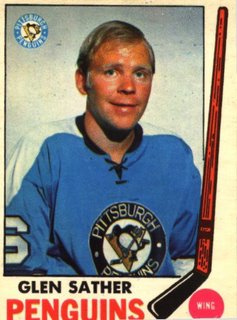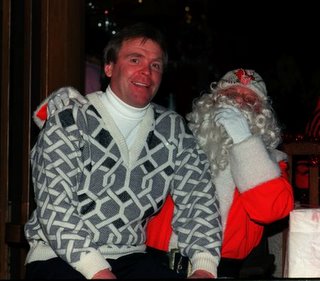Should We Be Cutting Slats Some Slack?
On June 1, 2000, long-time Edmonton Oiler President, Coach and General Manager Glen Sather began his new job as President and General Manager of the New York Rangers. The architect of the Oiler's dynasty, winning five Stanley Cups in seven years with a brand of hockey that revolutionized the sport, Sather finally wore out his welcome with the Oilers organization. The record he left behind in Edmonton is pretty spectacular:
• 21 years as General Manager
• 5 Stanley Cup wins, 1 Stanley Cup loss, between 1984-1990, with a team that had entered the NHL in 1979
• 3 President's Trophies as the NHL's top regular season team
• 6 Division Titles
• 6 Conference Championships
• 12 straight WHA and NHL playoff appearances
• 932 NHL regular season games as coach
• Record of 497-314-121 as coach
• 9th on the NHL's all-time coaching list with 497 victories
• Record of 89-37-1 as coach in 127 NHL playoff games
• .706 winning percentage in playoffs as coach
• Fifth on the all-time list for playoff wins as coach with 89
• Jack Adams Trophy as the NHL's Coach of the Year in 1985-86
• One of only six coaches to coach in five or more NHL All-Star Games
• Coach of Canada Cup 84 championship team
• One of the General Managers of Canada Cup 87's championship team
• One of the General Managers of Canada Cup 91's championship team
• General Manager of the gold medal-winning team in the 1994 World Hockey Championships
• Elected into the Hockey Hall of Fame as a Builder in 1997

There is no doubt that Sather built up an impressive resume in Edmonton, but it was one that faltered over the years. Most of the Oiler's success came between 1980 and 1990, with players like Gretzky, Messier, Coffey, Fuhr, Kurri, Anderson, Lowe and Moog on the roster. Once all of those players were gone, playing in larger markets with much larger bank accounts, Sather and the Oilers did not fare so well. In large part, this had to do with the horrible draft picks that Sather made as General Manager. If it wasn't for his ability to pull off ridiculously advantageous trades, the Oilers would have done far worse in the 90's than they did. As the GM of the Oilers, Sather long complained about the difficulties of trying to build a successful team in a small-market, and openly ridiculed General Managers from large markets who overpaid their NHL talent. When Sather left to join the Rangers, many wondered how well he would do in a large market with a seemingly unlimited budget. Would he be a success? Or would he fail as a GM in New York, illuminating his resume as one padded by the great players he was surrounded with in the Oilers hey-day? Would he refuse to give players exorbitant salaries, even though he could afford to? Or would he succumb to the temptations of the Big Apple--flush with money, little patience, and unrealistic expectations?
 Well, in his first four years as General Manager of the Blueshirts, Sather was an unmitigated disaster. Not only did his team fail to make the playoffs in every one of those years; they also managed to waste an enormous amount of money on players who gave very little back in terms of production.
Well, in his first four years as General Manager of the Blueshirts, Sather was an unmitigated disaster. Not only did his team fail to make the playoffs in every one of those years; they also managed to waste an enormous amount of money on players who gave very little back in terms of production.2000-2001: $56.9 million team salary; 72 pts; miss the playoffsThe easy answer, then, is to say that Sather's time in Edmonton had more to do with the players he coached than his own talents as a coach or GM. And looking at the money he spent, especially on players like Bure and Holik, it is easy to claim that Sather is a hypocrite of the greatest magnitude.
2001-2002: $64.8 million team salary; 80 pts; miss the playoffs
2002-2003: $76.5 million team salary; 78 pts; miss the playoffs
2003-2004: $76.5 million team salary; 69 pts; miss the playoffs
Major acquisitions that turned out to be major busts: Mark Messier, Guy Hebert, Vladamir Malakhov, Pavel Bure, Bobby Holik, Alexei Kovalev, Darius Kasparaitis, Boris Mironov, Mike Dunham, Eric Lindros, and Anson Carter.
Yet if we look at the 2005 season, at a "new NHL" of team salary caps and a stronger emphasis on the offensive side of the game, it appears that Sather--at least for now--is back on track. As of today, these are the Rangers statistics:
Team StandingsA solid, if not massive, amount of the Ranger's talent was drafted by Sather as GM.
Record: 25-14-7
Points: 57
Division Standing: 2nd in Atlantic Division
Conference Standing: 5th in Eastern Conference
Individual Statistics
Jaromir Jagr: 1st in points, 4th in assists, 4th in goals
Martin Straka: 26th in points, 5th in assists
Michael Nylander: 30th in assists
Petr Prucha: 20th in goals, best shot percentage in NHL, 5th in rookie points, 4th in rookie goals
Michal Rozsival:12th in +/-
Fedor Tyutin: 6th in point for rookie defenceman
Henrik Lundqvist: 4th in goals against average, 3rd in save percentage, 13th in wins, 10th in shut outs
Draft Picks On Current Rangers RosterThe Rangers had four prospects play in this year's World Junior Championships: Marc Staal, Tom Pyatt, Lauri Korpikoski, and Zdenek Bahensky. And nine Rangers will be playing in the upcoming Olympic Games in Turin, Italy: Marcel Hossa, Jaromir Jagr, Henrik Lundqvist, Marek Malik, Petr Prucha, Martin Rucinsky, Martin Straka, Darius Kasparaitis and Fedor Tyutin. Only the Avalanche and the Flyers have more players in the Olympic tournament. The Red Wings and the Senators each also have nine.
Henrik Lundqvist: Round 7, #205 overall, 2000 Draft
Dominic Moore: Round 3, #95 overall, 2000 Draft
Petr Prucha: Round 8, #240 overall, 2002 Draft
Fedor Tyutin: Round 2 #40 overall, 2001 Draft
*** Tom Poti and Martin Rucinsky were also drafted by Sather, during his tenure as Oilers GM.
So what has been the secret to Sather's success this season? The immediate answer lies in the one big ticket acquisition that Sather made in the "old NHL", to the tune of a paltry $7 million dollars a year. His name is Jaromir Jagr. Long considered the premier talent in the NHL, Jagr's play dropped off considerably after he signed with the Washington Capitals in 2001 (Washington still pays $4 million a year for Jagr's contract. The Rangers pay the other seven). This year, his first full season with the Rangers, Jagr is leading the NHL in points, and appears to once again be motivated in leading his team to success. This is in no small part due to the fact that Sather, in words and in actions, has made it very clear that the Rangers are Jagr's team. In addition to Jagr, six other players on the Rangers are from the Czech Republic: Martin Straka, Petr Sykora, Martin Rucinsky, Petr Prucha, Marek Malik and Michal Roszival. Jagr is happy, and the team is consequently doing very well.
Sather was also smart in hiring Tom Renney, not only as Vice President, Player Development in 2002, but as head coach of the Rangers in 2004. Renney is known for working with young talent, and he has done wonders so far this season. He has also worked quite a bit with Jagr, who has stated that he would have stayed and played in the Czech Republic were it not for Renney.
The biggest reason for Sather's success, however, may lie in all the years that he spent in Edmonton complaining about rising player salaries and the decline of the offensive game. While he was in New York when it occured--throwing money away to appease the Ranger's owners and fans--the player lockout and consequent CBA definitely have their roots in the dismantling of the Oilers and the loss of two franchises in Winnipeg and Quebec City. With the team salary cap and the new rules promoting more offensive play, Sather seems to be back in his natural environment. He can build teams based on speed and skill, without having to worry as much about how much it will cost. He also doesn't have to worry about owners and fans demanding that the Rangers sign the biggest player on the free-agent market. Post-CBA, teams can't just sign players without fear of consequence.
It is true that Sather has been fortunate. He was able to afford a player like Jaromir Jagr before the lockout, and can now reap the benefits of new rule changes in the game, having the greatest player in the world playing unfettered, wide-open hockey. But it should be noted that Sather jetted almost his entire roster before this season. Eric Lindros, Bobby Holik, Brian Leetch, Boris Mironov, Matthew Barnaby, Anson Carter, Petr Nedved, Jamie Lundmark, Vladimir Malakhov, Greg deVries, Alex Kovalev and Mark Messier are all gone. Tom Poti is the longest serving Ranger, at two and a half years. He has made wise acquisitions in Straka, Sykora, Malik, Stev Rucchin, and Ville Nieminen. The Rangers have the best player in the world, four solid lines, very good goaltending in Lundqvist and Kevin Weekes, excellent rookies and young players both on the team and in the minors, a well-liked and accomplished coach, all for the price of $34,828,400 pre-Jagr ( I don't know how much of Jagr's $7.8 million a year Washington nows pays under the new CBA). Sure it is only half a season, but shouldn't we cut Glen Sather just a little bit of slack?




0 Comments:
Post a Comment
<< Home